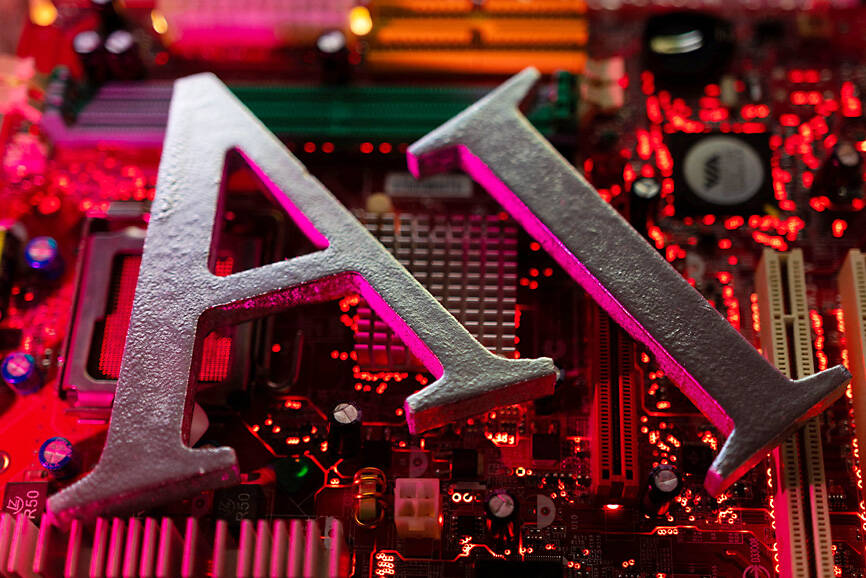The National Security Bureau (NSB) plans to expand recruitment to counter foreign interference using artificial intelligence (AI) technology.
The bureau commented on the plan in a recent report to the Legislative Yuan, following a written query from Democratic Progressive Party Legislator Chao Tian-lin (趙天麟).
The US National Security Agency said that since last year Beijing has begun using AI to spread propaganda on so-called “fake news channels,” said Chao, adding that in response to the rapid development of AI and its huge impact on several industries, the US in September announced the creation of an AI Security Center.

Photo: Reuters
Chao asked the bureau whether Taiwan is facing AI-related security threats from hostile foreign forces, and whether it has plans to expand and train information and intelligence personnel.
The bureau said in its report that the use of AI comes with risks, as it can be used to generate hacking tools and compile controversial information, and could result in personal information leaks.
Bureau staff are developing the ability to use emerging technologies to promote intelligence operations and guard against cybersecurity threats through international cooperation and exchanges with those in the tech industry, the report said.
The bureau is also expanding and diversifying its recruitment channels to help better face the new challenges posed by these technologies, it said.
It would continue to monitor the development of AI and its potential threats to warn the government in a timely manner and reduce any impact on national security, the report said.
Institute for National Defense and Security Research Acting Deputy CEO Shen Ming-shih (沈明室) yesterday said it is crucial to use AI to counter cognitive warfare.
The government must respond quickly, identify incorrect information and provide the facts, especially if the situation escalates or during war, he said.
Washington’s AI Security Center was created under the US National Security Agency, Shen said, adding that Taiwan could establish such a center in the National Security or the Military Intelligence bureaus.

A magnitude 7.0 earthquake struck off Yilan at 11:05pm yesterday, the Central Weather Administration (CWA) said. The epicenter was located at sea, about 32.3km east of Yilan County Hall, at a depth of 72.8km, CWA data showed There were no immediate reports of damage. The intensity of the quake, which gauges the actual effect of a seismic event, measured 4 in Yilan County area on Taiwan’s seven-tier intensity scale, the data showed. It measured 4 in other parts of eastern, northern and central Taiwan as well as Tainan, and 3 in Kaohsiung and Pingtung County, and 2 in Lienchiang and Penghu counties and 1

FOREIGN INTERFERENCE: Beijing would likely intensify public opinion warfare in next year’s local elections to prevent Lai from getting re-elected, the ‘Yomiuri Shimbun’ said Internal documents from a Chinese artificial intelligence (AI) company indicated that China has been using the technology to intervene in foreign elections, including propaganda targeting Taiwan’s local elections next year and presidential elections in 2028, a Japanese newspaper reported yesterday. The Institute of National Security of Vanderbilt University obtained nearly 400 pages of documents from GoLaxy, a company with ties to the Chinese government, and found evidence that it had apparently deployed sophisticated, AI-driven propaganda campaigns in Hong Kong and Taiwan to shape public opinion, the Yomiuri Shimbun reported. GoLaxy provides insights, situation analysis and public opinion-shaping technology by conducting network surveillance

‘POLITICAL GAME’: DPP lawmakers said the motion would not meet the legislative threshold needed, and accused the KMT and the TPP of trivializing the Constitution The Legislative Yuan yesterday approved a motion to initiate impeachment proceedings against President William Lai (賴清德), saying he had undermined Taiwan’s constitutional order and democracy. The motion was approved 61-50 by lawmakers from the main opposition Chinese Nationalist Party (KMT) and the smaller Taiwan People’s Party (TPP), who together hold a legislative majority. Under the motion, a roll call vote for impeachment would be held on May 19 next year, after various hearings are held and Lai is given the chance to defend himself. The move came after Lai on Monday last week did not promulgate an amendment passed by the legislature that

AFTERMATH: The Taipei City Government said it received 39 minor incident reports including gas leaks, water leaks and outages, and a damaged traffic signal A magnitude 7.0 earthquake struck off Taiwan’s northeastern coast late on Saturday, producing only two major aftershocks as of yesterday noon, the Central Weather Administration (CWA) said. The limited aftershocks contrast with last year’s major earthquake in Hualien County, as Saturday’s earthquake occurred at a greater depth in a subduction zone. Saturday’s earthquake struck at 11:05pm, with its hypocenter about 32.3km east of Yilan County Hall, at a depth of 72.8km. Shaking was felt in 17 administrative regions north of Tainan and in eastern Taiwan, reaching intensity level 4 on Taiwan’s seven-tier seismic scale, the CWA said. In Hualien, the